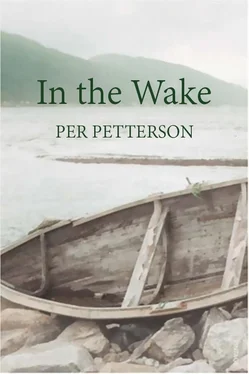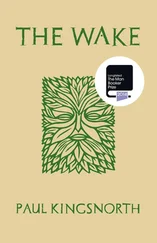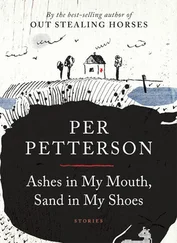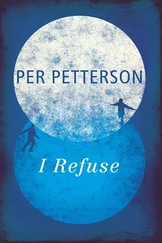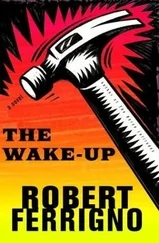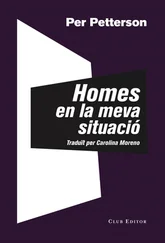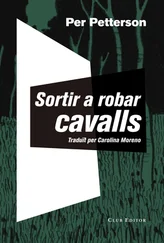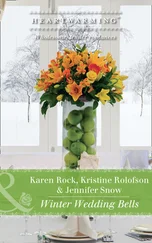“Hi,” I say, and he says:
“Hi” with a smile, and I unlock the door, push it open and make a slight bow with one arm out. The arm trembles, and I do not know why. Perhaps because I have forgotten to eat again. He does not miss that.
“Go on in,” I say. And so he does, takes a step across the threshold, then stops short and looks at the splinters of glass sparkling like a carpet right over to the living-room door, and he looks at me and grows serious. He points at the floor with an enquiring look on his face.
“That’s nothing,” I say.
He looks as if he understands what I say, and he looks as if he does not agree. Perhaps he has read Basho. He shakes his head and says: “Problem.” Just like that. And then he points at me, and not at my face, rather at where my heart is. I consider whether I have a problem in that area, but there is none that I can explain to him, not in the language he and I use. What I have is a broken mirror. But I know I am glad he is concerned. And he has three words now. That almost elates me.
“One moment,” I say and stop him with my hands. I fetch a brush and a dustpan and sweep a way for us through the glass splinters from the front door to the living room, and I wave him on.
“Come on in,” I say. “Coffee?” I ask, and he smiles and understands that word well without any trouble and follows me into the kitchen. I indicate one of the chairs with my hand, and he sits down and takes the book from under his arm and places it on the table in front of the brass bowl. The bowl glitters newly polished in the light from the window. I can see it makes him pleased. I am pleased too. I take the groceries out of the shopping bag and spread them out on the worktop, and for want of something more oriental I make some ferociously strong coffee with the Co-op’s green brand, the way I hope he will like it. Fortunately there is a clean cloth on the table, and I lay cups and bowls and plates from the same service, the finest I have, which I inherited from my mother, who brought it with her from Denmark in the early fifties. Suddenly the way everything looks seems important, that everything is for real, and that he understands that, because in his part of the world the drinking of coffee is more than filling a mug and taking it out on the balcony. After all, I am not completely ignorant. I pour milk into a small jug and put sugar in a matching bowl, and find two teaspoons that are actually silver. I get a packet of oatcakes from the shopping bag, tear it open and take out a suitable number and spread them with light margarine, put them in a small basket that someone who once lived here left behind, and for a moment I wonder whether to light some candles. But I do not have any candles, and anyway it is the middle of the day, and with candles it might have looked like a rendezvous.
When there is nothing more to be done, I sit down and pour out his coffee and wait until he has helped himself to sugar and stirred with the spoon and taken the first mouthful. He nods and smiles. That is a proper cup of coffee, is what he thinks, and I fill my own cup and have a taste.
“A bit on the strong side if you ask me,” I say, “but then I am Norwegian.” and he is with me, whether he understands what I say or not, and I take a biscuit and he takes a biscuit, and we chew and drink coffee for a while without saying anything, and then I remember the dream of the house I was in with my father, that they were after me, and that he helped me get out before it was too late.
“Is your father alive?” I ask, then wait before saying:
“ My father is dead. That’s not so strange, he would have been more than eighty now and maybe dead no matter what had happened. It is really much worse than the others are dead. But the odd thing is that it took me six years to realise it is unbearable. Can you understand that?” I say, shaking my head, and he points at me and says:
“Problem,” and I do not deny it. When you run naked through your hall in the night and on impulse smash the wall mirror into powder, you do have a small problem, that goes without saying. I nod and openly admit it, and he points to his own heart.
“Problem,” he says again. And I can understand that. He is thousands of miles from the place where he has lived for most of his life, and perhaps he has a father in a village in the far north of Iraq and he will never see him again, or that father is dead, and someone did kill him, and then he comes here, and the first word he learns is “thanks” and the third is “problem”. Then “hi” in the middle is not of much help. I nod again.
“I have seen you at night, you know,” I say. He cocks his head and looks at me enquiringly, and then I put my face in my hands and rock my body back and forth, and while I am doing this I realise I may have gone too far. I cautiously glance up at him. His eyes are shining and he strokes his moustache again and again, but he nods. Very slightly. I hasten to fill up his cup and pass him the basket of oatcakes. He is polite and takes some and has a mouthful of coffee, and then he puts his hand on the book and pushes it towards me and then opens his hands. I am to receive yet another gift. It is too much, really. I turn it over and see it is Memed, my Hawk by Yasar Kemal. I remember well when I read it fifteen years ago. Remember the chair I was sitting in and the colour of the curtains and the colours of the paint on the walls in the apartment in Bjølsen where I lived then, and the humming sound of buses on their way in to the roundabout outside my windows and the brakes at the bus stop and the doors opening. Remember the Irish music I played each day that became linked for ever with the burning thistles on the Tsjukorova plain and the stockings that Memed’s sweetheart knitted in a unique pattern meant especially for him. And I remember who gave me that book, and that I asked if she could knit a pair of stockings like that for me. And she did, as well as she could from Kemal’s description in the book. And suddenly her face is back, and the years when I saw that face, and the scent of her and the way she walked, and the way she ran her fingers through her hair to push it away from her eyes, and then the face again as it was in the labour ward twice with me on my knees by her bed, and once more as it was at the end, distorted and furious, and at once my throat starts to hurt. I desperately clear it and stand up, I take his hand and say:
“Thanks,” and I cough again. “Just a moment,” I say and put down the book and leave the table and walk through the living room to the bathroom in the hall. There I turn on the tap and put the plug in and let the water fill the basin more than halfway up. I take a deep breath and hold it down and bend and push my face into the water. It is icy cold, but I stand like that until I have to breathe. This time I dry my face thoroughly in a big towel hanging on the wall. I run my hands through my hair and look at myself in the mirror. I do not know whom I resemble any more. Then I go back. He sits on his chair and has not moved. He looks at me, and I know what he is going to say. I nod.
“Problem,” I say. No question.
TIME SLIDES INTO April. It is spring, no doubt about it. I reread books. I have made a list of the twenty I have liked the best, and after several sittings it is down to ten. Memed, my Hawk is one of them. I am looking for something, but I do not know what.
My brother is discharged from hospital after a short stay in the psychiatric ward in the basement, the bunker, as it is called. I do not visit him. There is no point, and anyway they cannot give him any help there that he would accept. So he does not stay long, and when he gets home he is into divorce proceedings at once. I talk to Randi on the telephone. She is the one who calls me.
Читать дальше
